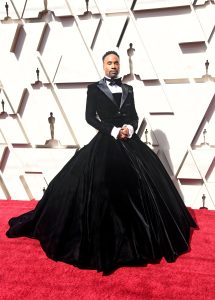
Harry Styles wore a dress becoming the first male given a solo feature on Vogue. This milestone achievement reached more audience than ever as this magazine never featured a solo male on the cover. For context, Harry is very vocal about his straight tendencies and so for him to be in a dress did not have anything to do with his gender as far as the public is concerned. Billy Porter, a gay man was the first man to wear a dress on the red carpet to push gender boundaries, but he was snubbed the opportunity to grace the cover. Billy publicly called out Vogue and Harry in disagreement with the cover saying that allowing a straight white man to be given this opportunity to influence so many people highlights the ‘erasure’ of the contribution of queer individuals to popular culture.
As Kendall Gerdes wrote, “Gender is performative because it inscribes itself as a discourse each time it inscribes itself on a body, as a lived experience.” The issue with the cover is not that Harry wore a dress but that he is portraying a gender identity that is not a lived experience for him. Neither is he part of the community that has this gender identity as part of their daily experiences.
Since birth we have been taught how to act our gender and avoid looking like, acting like, and talking like the opposite gender. Before social media, gender was learned from those around us but in this age of mass media consumption, it is what is depicted online/in magazines that inform how gender is performed. Gender is something we do together that influences who we are and how we belong in communities. When one deviates from gender norms and does gender alone they are met with heavy criticism. Gender is reinforced through others who share the same gender identities because we don’t invent gender spontaneously but pick up on clues that inform our idea of the self in the larger community. That is why representation matters especially who is given the power (through social media) to influence others. Meaning members within communities should be the ones granted to grace the covers of pop culture bibles like Vogue to show others that they matter.
